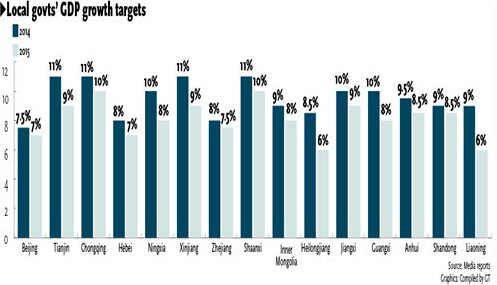

Economy still under pressure: experts
Fifteen provincial-level governments out of 17 that had published their economic growth targets as of Tuesday have cut their forecasts for 2015, to focus on quality and efficiency of growth amid a slowing economy.
Three out of China's four municipalities have lowered their 2015 growth targets. Beijing set its 2015 growth target at 7 percent, down from 7.5 percent in 2014. North China's Tianjin cut the 2015 forecast to 9 percent from 11 percent in 2014, and Southwest China's Chongqing has set a 10 percent growth goal for 2015, compared with 11 percent in 2014.
Many provinces have missed their growth targets for 2014. For instance, North China's Hebei Province saw GDP growth of 6.5 percent in 2014, compared with the target of 8 percent.
The lowering of growth targets "means that the economy is still facing considerable downward pressure, and it would be not realistic for the governments to set higher targets," Xu Hongcai, director of the Department of Information under the China Center for International Economic Exchanges, told the Global Times on Tuesday.
Shanghai has decided not to set a GDP growth target for 2015, emphasizing quality and efficiency of growth instead, according to a government work report posted on the municipality's website on Sunday.
Tibet has set its 2015 growth target at 12 percent, unchanged from that in 2014.
All the provincial governments are expected to have concluded their annual legislative and advisory sessions by mid-February, and their 2015 GDP targets are likely to have been released by then.
Tian Yun, chief editor of the China Macroeconomic Information Network, said that most provincial governments are expected to set lower 2015 growth targets as the overall economy in China is shifting gear toward a "new normal" state, featuring slower but healthier GDP growth.
"It is a sign that local governments now lay more emphasis on the quality of growth, instead of mere growth speed," Tian told the Global Times on Tuesday, noting that lower growth targets would also ease the country's structural reform.
China's economic growth slowed to 7.4 percent in 2014, the lowest level since 1990. Recent economic data also indicates that the economy is still facing downward pressure.
But the government has said the 2014 growth rate was within a "reasonable range" and that the economic structure is also improving. Consumption has surpassed investment as the major driving force for China's GDP growth. It contributed 51.2 percent to China's economic growth in 2014, according to data released by the Ministry of Commerce on January 21.
Tertiary industry accounted for 48.2 percent of China's total GDP in 2014, 5.6 percentage points more than secondary industry, according to data the National Bureau of Statistics released on January 20, which means that the services sector is now playing a bigger role than manufacturing in driving China's growth.
But Tian said that more emphasis on quality does not necessarily mean that GDP growth is not important, because if the growth is too slow, employment could be affected.
"Some local governments are still capable of maintaining high-speed growth, like Chongqing," he said.
Experts noted that local governments are expected to increase investment in infrastructure construction in 2015 and the central government's monetary policy may be further loosened to support the economy.
Many local governments have highlighted environmental protection in their 2015 government work reports. Hebei, which accounts for around a quarter of the country's steel production capacity, has proposed in its report to further cut outdated capacity in 2015.
The Beijing municipal government has set a target to improve efficiency of energy consumption in 2015 and to lower PM 2.5 pollution by 5 percent.
East China province follows national trend and cuts GDP target
2015-01-28Shanghai drops GDP growth target amid ‘new normal‘
2015-01-27China‘s 2015 GDP growth forecast at 6.8 pct: UBS
2015-01-26GDP gives way to growth quality
2015-01-26Copyright ©1999-2018
Chinanews.com. All rights reserved.
Reproduction in whole or in part without permission is prohibited.